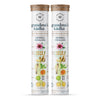The kadha is one of the most enduring medicinal concoctions that has survived through time. An Ayurvedic medicine so popular that it has become part of our folk remedies. One is likely to find some kadha in every region of the country with recipes that have been passed down through generations. In fact, many of us may be using our grandma's kadha recipe for making our own concoction.
Recently, it has received another filip as the government recommended this brew for boosting immunity. On its website the AYUSH or Department of Ayurveda, Yoga and Naturopathy, Unani, Siddha and Homoeopathy, recommended kadha for fortifying immunity against viruses like the SARS-COV-2. But even without the extra push, kadha has always been our go-to, whether for a cold, cough, or fever.
What is Kadha?
What is this kadha and how has it changed through time? A kadha is a decoction made by simmering herbs and spices in water over a period of time. The herbs and spices are added in specific proportions according to requirements. Most of these are commonplace ingredients that are found in our kitchens.
The kadha reflects the Ayurvedic philosophy of viewing food as healing elements for the body. The belief that ‘everything can be a drug’ prompted practitioners to use various elements of nature, from herbs, spices, to plants for therapeutic and medicinal purposes. So while food was responsible for giving the body strength and better immunity, it was also meant to be medicinal.
Kadha Vs Herbal teas: The kadha is similar to another common element in all traditional medicine, herbal teas. Herbs have been brewed in water for more than a millenia to address a whole host of ailments. There are a number of studies on various herbal teas that reveal the bioactive compounds, such as phenolic acids, carotenoids, flavonoids, polyacetylenes, coumarins, alkaloids, and terpenoids, in such concoctions.
Studies show that depending on the herb, these teas can be antioxidant, antiviral, anti inflammatory, and antiallergic. Broadly speaking, kadhas can be seen as a type of herbal tea. However, unlike herbal teas, kadhas are typically brewed in the water for longer. The recipe of a kadha is typically quite straightforward where certain spices and herbs in specific quantities are simmered in water. The process allows the bioactive compounds in the ingredients to be released into the water. The liquid is allowed to concentrate to make a potent brew.
Kadha Through the Ages
Like all food that are medicinal in nature, the kadhas has also gone through its own journey. But it has largely remained the same. For instance, most of us still possibly follow our grandma’s kadha recipes with almost no embellishments.
Early kadhas: Was the kadha, in its original form, different from what we have today? Not substantially. The only difference would be the availability of ingredients. Today we can get almost any ingredient home delivered. In days gone by, this would have been less possible. But the common practice of Ayurveda meant that certain more exotic elements like mulethi were available at the nearest practitioner. Additionally, most kadhas use ingredients easily available in our kitchens.
Modern kadhas: The kadha today has changed in character only slightly from the ancient times. We still use the same ingredients, including tulsi, turmeric, black pepper, and amla. The only difference is that many of these ingredients are now easily available online or at a nearest health store. You can also get them in more convenient-to-use form, such as powdered black pepper or turmeric. Some modern kadhas have also adopted new elements such as apple cider vinegar or echinacea. These ingredients may not find mention in our ancient texts, but they are packed with bioactive compounds.
Instant Kadhas: An interesting concept that has emerged in more recent years is the availability of instant kadhas. You can buy kadha powder and mix it in hot water.

Even more convenient is Grandma’s Kadha, effervescent tablets by Wellbeing Nutrition. Each tablet contains echinacea, coriander, mulethi, kulinjan, tulsi, black pepper, turmeric, amla, adulsa, dry ginger, bharangi, shankapushpi, and kalmegh. To make the kadha, you only need to add one tablet of our Grandma’s Kadha in a cup of hot water. Vegan, organic, sugar-free, and GMP-certified, these tablets allow you to make a kadha in a minute.
References:
● AYUSH Official Website, https://www.ayush.gov.in/
● Historical Perspective of Traditional Indigenous Medical Practices: The Current Renaissance and Conservation of Herbal Resources, Si-Yuan Pan, Gerhard Litscher, Si-Hua Gao, Shu-Feng Zhou, Zhi-Ling Yu, Hou-Qi Chen, Shuo-Feng Zhang, Min-Ke Tang, Jian-Ning Sun, and Kam-Ming Ko, Evidence-based Complementary and Alternative Medicine, 2014, doi: 10.1155/2014/525340, (https://www.ncbi.nlm.nih.gov/pmc/articles/PMC4020364/)
● Herbal beverages: Bioactive compounds and their role in disease risk reduction - A review, Anoma Chandrasekaraa and Fereidoon Shahidib, Journal of Traditional and Complementary Medicine, 2018, doi: 10.1016/j.jtcme.2017.08.006, (https://www.ncbi.nlm.nih.gov/pmc/articles/PMC6174262/)
● Kadha: The Traditional Indian Medicinal Drink With Amazing Health Benefits, (https://www.news18.com/news/lifestyle/kadha-herbal-ayurvedic-drink-benefits-myupchar-2757253.html)
● A glimpse of Ayurveda – The forgotten history and principles of Indian traditional medicine, Yogini S. Jaiswal and Leonard L. Williams, Journal of Traditional and Complementary Medicine, 2016, doi: 10.1016/j.jtcme.2016.02.002, (https://www.ncbi.nlm.nih.gov/pmc/articles/PMC5198827/)
● What is Kadha and how does it improve the immune system? Know the recipe, (https://www.timesnownews.com/health/article/what-is-kadha-and-how-does-it-improve-immune-system-know-the-recipe/577764)
● Why Urban Indians Have Taken To Kadha, (https://www.livemint.com/news/india/why-urban-indians-have-taken-to-kadha-11592228372521.html)
● Ayurvedic Kadha: A Perfect Immunity Booster, (https://www.artofliving.org/in-en/ayurveda/kadha-for-immunity)




























 DOWNLOAD NOW
DOWNLOAD NOW
